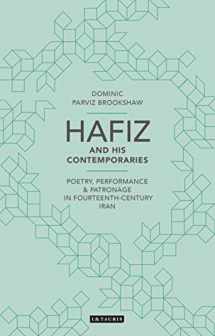
Hafiz and His Contemporaries: Poetry, Performance and Patronage in Fourteenth Century Iran (British Institute of Persian Studies)
Book details
Summary
Description
Despite his towering presence in premodern Persian letters, Shams al-Din Muhammad Hafiz of Shiraz (d. 1390) remains an elusive and opaque character for many. In order to look behind the hyperbole that surrounds Hafiz's poetry and penetrate the quasi-hagiographical film that obscures the poet himself, this book attempts a contextualisation of Hafiz that is at once socio-political, historical, and literary. Here, Hafiz's ghazals (short, monorhyme, broadly amorous lyric poems) are read comparatively against similar texts composed by his less-studied rivals in the hyper competitive, imitative, and profoundly intertextual environment of fourteenth-century Shiraz. By bringing Hafiz's lyric poetry into productive, detailed dialogue with that of the counterhegemonic satirist, 'Ubayd Zakani (d. 1371), and the marginalised Jahan-Malik Khatun (d. after 1391; the most prolific female poet of premodern Iran), our received understanding of this most iconic of stages in the development of the Persian ghazal is disrupted, and new avenues for literary exploration open up.
Looking beyond the particular milieu of Shiraz, this study re-assesses Hafiz's place in the Persian poetic canon through reading his poems alongside those produced by professional poets in other major centres of Persian literary activity who enjoyed comparable fame in the fourteenth century. Recognising the aesthetic achievements of his contemporaries does not diminish the splendour of Hafiz's, rather it forces us to accept that Hafiz was but one member of a band of poets who jostled for the limelight in competing, often intersecting, patronage and reception networks that facilitated intense cultural exchange between the cities of post-Mongol Iran and Iraq.
Hafiz's ghazals, characterised as they are by conscious and deliberate hybridity, ambiguity, and polysemy, are products of a creative mind bent on experimenting with genre. While in no way seeking to deny the mystical stratum of the Persian ghazal in its fourteenth-century manifestation, this study emphasises the courtly and profane dimensions of the form, and regards Hafiz through a sober lens with keen attention to his dynamic role at the heart of a vibrant poetic community that was at once both fiercely local and boldly cosmopolitan.


We would LOVE it if you could help us and other readers by reviewing the book
Book review



